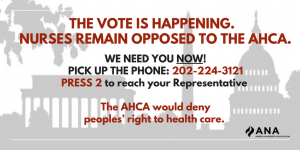Last week, Michele Woodward, a prominent Republican and former White House staffer in the Reagan Administration, posted a powerful critique of the Republican health care reform bill known as the American Health Care Act. Ms. Woodward noted of the legislation that:
You see, the health care bill passed in the House today has nothing to do with making sure all Americans have access to healthcare. The GOP leadership didn’t go in saying, “How can we raise the standard of living for all Americans by insuring their health?” No, they did not. Instead, they said, “How much money can we take out of this program?” Why? Because taking money from Obamacare allows the tax cuts the GOP really wants. Tax cuts that mostly benefit the wealthy and large corporations. Tax cuts that will continue to ensure that we don’t spend enough on critical infrastructure. They are single-minded in their pursuit of starving the government of funds and, thereby, fundamentally changing the American way of life for the worse.
The American Nurses Association takes similar issue with this piece of legislation. First and foremost, the American Health Care Act would deny millions of Americans access to critical health care services. Although the Republicans in the House decided to blindly vote on this bill without knowing its financial or human impact, it is not substantially different from the previous version of the bill which would have resulted in a loss of health care coverage for 24 million Americans and an $880 billion reduction in Medicaid funding. This version, in fact, would also put at risk the ability of the roughly 15 million Americans with pre-existing conditions to purchase and access critical health care services. The process by which the legislation moved through the House was also striking for its lack of transparency and the absence of meaningful debate, stakeholder input, or bipartisan collaboration. The House, in short, was reckless in its determination to pass this flawed legislation.
Further, this legislation marginalizes vulnerable populations by eroding their ability to access health care services for the benefit of the wealthiest Americans, who would receive a large tax cut. Such a shift goes against ANA’s core principles of health care reform and, as Ms. Woodward pointed out, would fundamentally change the American way of life for the worse. The American Nurses Association stands in opposition to this bill and urges the Senate to take a far more judicious and bipartisan approach to health care reform which ensures that all Americans – rich and poor, young and old, sick and healthy alike – have access to comprehensive health care services.

